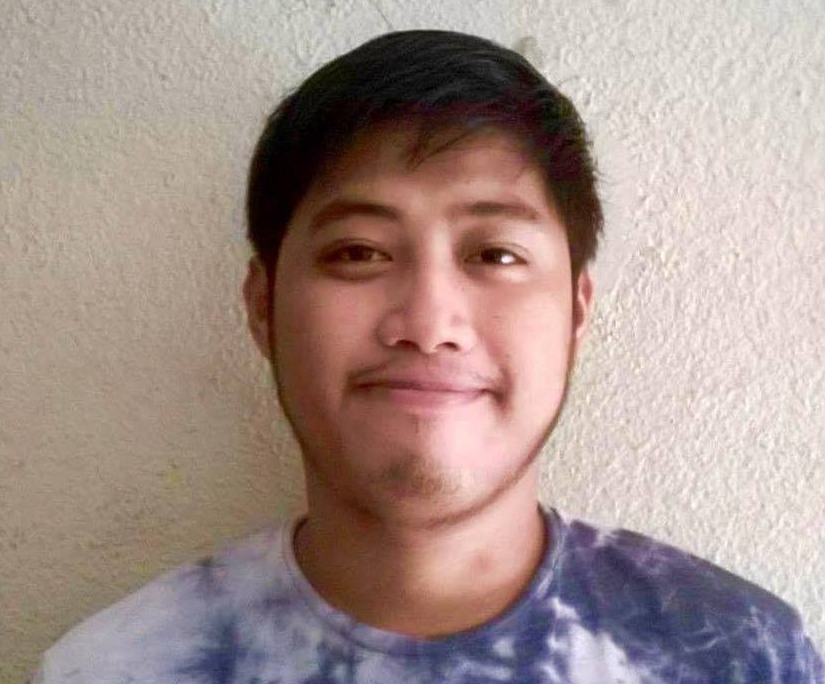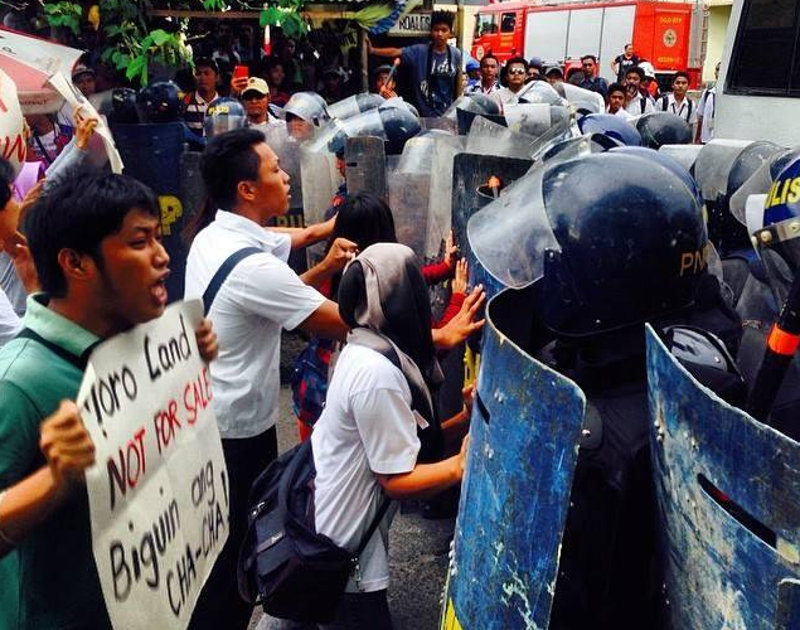MANILA, Philippines (ViaNews)- “They tortured me.”
These were the first words that Filipino human rights activist Jerome Succor Aba uttered as relief washed over him upon seeing a small group of lawmakers and fellow activists who came to fetch him at the Manila airport on April 20, 2018.
Aba, who was granted a 10-year multiple entry visa in March, was invited by a group of ecumenical and human rights group to attend a speaking tour in the United States on the human rights situation in the Philippines.
Upon arriving in the San Francisco International Airport on April 17, 2018, however, Aba was escorted by two immigration officers to the Homeland Security Office, where he was later subjected to a body search. All of his belongings, including his mobile phone, were confiscated. He was put in handcuffs.
His horrifying and appalling ordeal begins here.
[caption id="attachment_4114" align="aligncenter" width="825"]

Jerome Aladdin Succor Aba. Photo by: Jerome Aladdin Succor Aba Facebook profile.[/caption]
Tortured
Karapatan, a local human rights group here, released a detailed report on Aba’s appalling ordeal from the hands of US authorities – namely the US Department of Homeland Security and the US Customs and Border Protection.
During the first four hours, Aba was subjected to interrogation by an official whose nameplate bore “Reyes,” whose line of questioning, the activist noted, was intended to lead him to a forced confession that he is either a terrorist or a communist or both.
He was then brought to a second room, where he was again subjected to a three-hour interrogation. Here, US authorities demanded to know why there are only four contacts in his mobile phone and that there were only a few files saved in his laptop.
“You are trained for this,” one of the officers shouted at Aba.
Aba was then moved to the third room, where he was once again interrogated for at least three hours. He was asked regarding his political affiliations and his views on Philippine President Rodrigo Duterte’s controversial war on drugs.
In the fourth room, he was once again subjected to interrogation and was asked if he is a terrorist. He was also shown a photo of journalist and long-time activist Satur Ocampo, whom officers alleged is a terrorist.
He was then told to remove his clothes and turned on an electric fan and pointed it at Aba. The interrogation then resumed.
At one point, Aba was left alone with a pistol and a cellular phone. He did not touch both items, which angered the officers and alleged that he was trained to use such.
Aba was denied his right to counsel. And every time he has an opportunity to raise it, officers would tell him that he does not have a right and that the United Nations Declaration of Human Rights does not apply in his situation.
The Filipino activist was only given food after 24 hours. And despite telling them that he is a Muslim, Aba alleged that US authorities gave him a ham sandwich. Fortunately, other detainees were able to spare him some food, which somehow relieved his hunger.
Outside the four cold walls of the interrogation room, members of the ecumenical groups who invited Aba to attend the speaking tour in the United States have been pestering concerned US government agencies with queries of his whereabouts. One of the officers was even quoted as saying that they could no longer keep him because “people are calling.”
This prompted the CBP officers to eventually decide to send him back to the Philippines. Before taking the plane, however, Aba was made to sign several blank papers.
Denial
The US Customs and Border Protection (CBP) has denied all the allegations of Aba, adding that they have “exercised discretion” when they found the human rights activist as “inadmissible to the United States.”
They alleged that Aba was made to wait overnight for the next available flight in the CBP waiting lounge, along with other travelers, where there are reclining chairs, blankets, and access to restrooms, food, and water.
“CBP interviews passengers in offices, not stainless rooms. CBP has a very strict policy regarding persons in custody and personal searches. CBP never asked Mr. Aba to remove his clothing,” the statement read.
They also denied having handed Aba a gun and grenade and the allegation that they served him pork.
While the CBP did not elaborate on which among the more than 60 grounds can a visitor be considered as inadmissible, the US agency stated, “the country of origin and human rights activism of a foreign national are not determining factors for inadmissibility.”
“We do not discount the fact that Aba might have been singled out not only because he is a human rights defender, but because he is a Moro activist. In the implementation of the arbitrary, repressive, and discriminatory Muslim ban in the US, individuals from countries with a predominantly Muslim population have been denied entry, but Aba’s case proves that individual Muslims are also being targeted, regardless of the country,” said Karapatan secretary general Cristina Palabay.
Aba, in a statement posted on his Facebook account, said it was “certainly easy” for US authorities to deny the 28-hour torture and that he is “experiencing torture all over again, with all the lies stated by the CBP.”
“But it has not really been that easy for me. In fact, ever since I arrived in the Philippines on April 20, I am confronting the trauma, the sleeplessness, nightmares, and anxieties, as I relive the forms of torture they have inflicted on my person,” he added.
Aba reiterated that he was “treated inhumanely and was stripped of my human dignity” and that he signed documents in his “desire that the interrogation and torture would stop, and for me to be able to be sent back home to the Philippines.”
“It is difficult enough to have experienced these indignities. What pains and angers me more are the bare-faced lies of the CBP officials in their attempt to evade responsibility,” he said.
More torture allegations
This is, of course, not the first time that the US government has been accused of torture and consequently denied it.
Late in 2017, the United Nations special rapporteur on torture revealed that US authorities may still be conducting “enhanced interrogation techniques” in the infamous Guantanamo Bay detention facility – a decade since the US government had banned it.
The said detention facility was opened to hold alleged suspects in the September 11 attack. Since then, the US government has been put on global spotlight over allegations of inhuman treatment of prisoners in their covert operations there. It was later learned, in response to public pressure, that US authorities conducted deprivation of sleep, dousing of ice water, among others, designed to disrupt one’s senses and increase their helplessness.
According to a New York Times report, the US government had other so-called “black sites” where their prisoners were secretly held apart from the facility in Guantanamo Bay. These are found in Stare Kiejkuty in Poland, Vilnius in Lithuania, Bucharest in Romania, Kabul in Afghanistan, and Chiang Mai in Thailand.
As expected, US authorities have denied the allegations, saying that the U.N. expert had no proof to back its report.
Meanwhile, US President Donald Trump has recently called for the revival of the infamous detention facility.
[caption id="attachment_4122" align="aligncenter" width="800"]

Filipino activist Jerome Aba-protesting the assassination of Ninoy Aquino in Cotabato city. Photo by: @JeromeSuccorAba Twitter account on 11 Mar 2014.[/caption]
Filing of diplomatic protest urged
The Philippine government, for its part, has been urged to file a diplomatic protest against the US government for Aba’s ordeal.
On April 25, 2018, Aba, along with lawyers and human rights activists here, submitted a letter to Philippine Foreign Affairs secretary Alan Peter Cayetano to formally demand an independent, impartial investigation on his torture and arbitrary detention, among other human rights violations that he suffered.
He has also asked the country’s foreign affairs secretary to hold accountable Philippine consulate officers in San Francisco for their apparent neglect of his case, according to human rights group Karapatan.
Secretary Cayetano, however, has yet to make a public pronouncement in response to Aba’s letter, according to human rights lawyer Kathy Panguban of the National Union of Peoples’ Lawyers.
Panguban told ViaNews that Aba’s lawyers in the Philippines are consulting with a US-based legal team on all possible recourse both here and in the US to ensure that justice will be served for the human rights activist.
Aba said, “my coming forward to tell my story comes from the sense of obligation and hope that by exacting accountability and demanding justice for what happened to me, such will not happen to any Filipino or Muslim or any person again. My courage comes from the same conviction of my fellow human rights defenders who believe that activism is never a crime.” (ViaNews)
 Jerome Aladdin Succor Aba. Photo by: Jerome Aladdin Succor Aba Facebook profile.[/caption]
Jerome Aladdin Succor Aba. Photo by: Jerome Aladdin Succor Aba Facebook profile.[/caption]
 Filipino activist Jerome Aba-protesting the assassination of Ninoy Aquino in Cotabato city. Photo by: @JeromeSuccorAba Twitter account on 11 Mar 2014.[/caption]
Filipino activist Jerome Aba-protesting the assassination of Ninoy Aquino in Cotabato city. Photo by: @JeromeSuccorAba Twitter account on 11 Mar 2014.[/caption]

